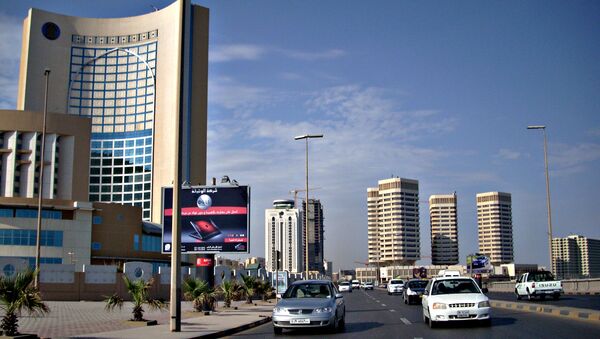Details are sketchy at the moment, but reports indicate that a handful of terrorists (which a Twitter account links to ISIL) exploded a car bomb, killed three guards, and took an unspecified number of hostages in the Corinthia Hotel, a place popular with foreigners. Although tragic in and of itself, the greater tragedy is that the West has largely ignored Libya and its festering terrorist scourge ever since it illegally took out its longtime leader four years ago.
Terrorism has been given a free pass by the Western ‘anti-terrorism coalition’ provided that it didn’t interfere with oil exports, although France has lately been pressing the case for yet another ‘intervention’. Now though, with terrorists having attacked a Western-affiliated soft target in the militia-controlled capital, Western governments may finally take notice of the mess they’ve created, but should they act on it, it may be all for the wrong reasons once again.
Through The Shredder
Libya used to have the highest Human Development Index for Africa during Gaddafi’s leadership, but now it’s plunged to abysmal levels in the course of only a few years. The War on Libya destroyed large amounts of the country’s infrastructure, led to ethnic reprisals against the Sub-Saharan African guest workers previously employed in the country, and all but tore the previously unified state apart into three separate entities:
* Tripolitania: Located along the northern coast and housing the country’s capital and is almost entirely controlled by a hodgepodge of terrorist groups.
* Cyrenaica: This region is centered on Benghazi in the northeast (although it extends all the way south to Chad), and the internationally recognized government moved its capital to the small city of Tobruk near the Egyptian border due to terrorists capturing Benghazi.
* Fezzan: Comprising the vast, geographically obscure, and underpopulated desert area of southwest Libya, this portion of the country isn’t clearly under anyone’s control, thereby raising concerns that it could turn into a terrorist haven.
The country’s split extends well past geography and into politics as well. A myriad of terrorist groups are fighting amongst both themselves and the internationally recognized government, all while the apparently ‘rogue’ General Khalifa Haftar (who has been accused of being a CIA asset) is trying to clean everything up. Complicating matters even further, Qatar and the UAE both hold heavy influence over the disparate fighting groups, and mysterious airstrikes (purportedly carried out by either Egypt or the UAE) have been undertaken against militants in recent months.
Terrorism All Around
As a result of all this chaos and the absolute breakdown of law and order, Libya has begun to look a lot like a large ‘Caliphate’ divided up into violently competing ‘emirates’. Terrorism abounds throughout the country, but the West has barely uttered a peep about it or given it the media attention such a black hole of destabilization deserves. Only rarely is mention made to events ongoing in the country, and even then, it’s only because they’re too big to ignore (like the killing of Ambassador Stevens).
One such event was the destruction of Tripoli’s airport over the summer, when most of the aircraft there were obliterated in fighting between two terrorist groups. The news reporting at the time was but a small blip on the global radar and no follow-up coverage commenced. This is not unlike the destruction of Donetsk’s airport, but a crucial difference remains. When the West does occasionally report on what happened there, the blame is solely leveled at the feet of the so-called ‘pro-Russian separatists’, thereby scoring an inaccurate cheap shot against Russia. In the case of Tripoli’s airport, however, no such blame can be leveled at anyone besides the West itself, hence why follow-up coverage has been completely halted ever since it was first reported.
Moving back to the current day, the hotel siege is yet another one of those events which the mainstream media couldn’t ignore covering. The terrorists struck fear into the elites’ hearts when they stormed the floor that was supposedly occupied by some foreign diplomats and company representatives (supposedly from Europe and Turkey). Although only five foreigners were killed, that’s symbolic enough to get the media talking more about the terrorist threat plaguing Libya, and to ignore questions about why such foreigners were in a city controlled by anti-government militants in the first place, let alone to apparently conduct business with unrecognized authorities.
Deja Vu
Another thing that the Western media may start chatting about is France’s recent proposal for another wave of foreign intervention in Libya. At the beginning of the year and a few days before the Charlie Hebdo attacks, the French Defense Minister said:
“Libya is chaos today and it is a breeding ground for terrorists that threaten the stability of Niger and, further afield, France…We think that the moment has come to ensure that the international community tackles the Libyan problem.”
One must be reminded that France had recently redeployed a few thousand of its Mali-based troops all throughout the Sahel region as part of Operation Barkhane, the supposed successor mission to Operation Seval in Mali. This sees French forces spread across Mauritania, Mali, Burkina Faso, Niger, and Chad, thereby encompassing a wide geographic belt along the continent.
France seems to have stepped back into its former colonial boots over the past few years, as it led the charge in the first War on Libya back in 2011, guided under the advice of self-proclaimed philosopher Bernard-Henri Levy. All of this has in turn transformed the country into the US’ Lead From Behind designator for much of Africa, which totally betrays its post-war Gaullist foreign policy tradition. Just like four years ago, then, France may once more lead the Western call for war in Libya, but it would be doing so to advance it and the US’ own geopolitical interests under anti-terrorism, and not ‘humanitarian intervention’, rhetoric.


